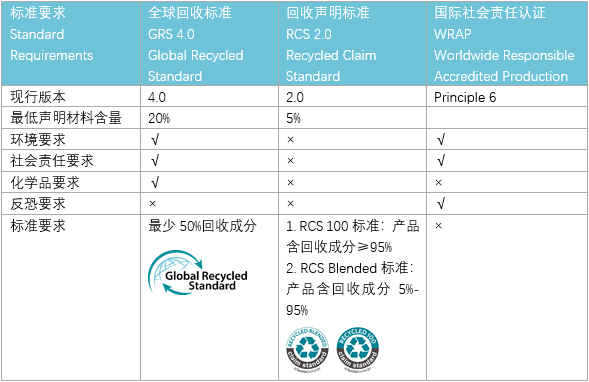GRS & RCS International General Recycling Standard
GRS and RCS are currently internationally recognized standards for recycled materials. Many internationally renowned brands such as ADDIDAS, 3M, PUMA, H&M, NIKE, etc. are members of this standard. GRS and RCS first started in the textile industry to prove that their products or raw materials contain certain recycled materials. Nowadays, due to the popularization of environmental awareness and the advancement of recycling technology, the number of products using recycled materials is increasing day by day. GRS and RCS can be found in various applied materials, such as plastics, rubber, metal and other industries.

1.What is the difference between GRS, RCS and WRAP?

2. Who needs GRS/RCS certification?
Raw material suppliers, processors, manufacturers, traders, warehouses, suppliers and brands, those who need to prove that their materials contain certain recycled content, and those who are willing to do their part for the earth.
3. Do traders need certification?
Anyone with legal title to a product must be certified. However, traders may be exempted from certification under certain circumstances. For example: traders did not repackage or relabel.
4. How often will it be reviewed?
Like general ISO certification, it is verified once a year. The only difference is that GRS and RCS are certified once a year. Unlike ISO 9001, a certificate is valid for 3 years and renewed every year.
5. How can I find certified manufacturers?
You can go to TE's following website and search by filtering standards (GRC/GRS), country, etc., or directly enter the manufacturer name https://textileexchange.org/integrity/
6. What is the certification process?
Management system establishment → Submit verification application → Verify quotation → Payment → Review → Improve audit deficiencies → Obtain certification.
7. How is the audit conducted?
The audit also includes "document review" and "field inspection" like the ISO audit:
◆ "Document Review": Investigate and review company documents, various systems and status
◆ "On-site inspection": Send auditors to the actual site to verify various conditions
8. How much does GRS and RCS certification cost?
The cost of the audit varies based on the number of man-days, number of factory sites, and industry. The cost of RCS certification is approximately US$4,000-7,000. Since GRS also includes social, chemical and environmental audits, the certification fee is usually around US$8,000-10,000. In addition to the many different factors that affect the cost, the final fee is determined by an audit by the certification body against the standards.
9. I am a retailer/brand and do not have certification, how can we use standard LOGO labels?
For retailers and brands that specialize in selling B2C products, LOGO can be used. As long as your supplier has obtained certification, you can submit an application for LOGO approval. The certification body will provide a standard LOGO style, and then follow Textile Exchange's label usage statement guidelines.
10. Can I change the color of the LOGO label by myself?
No, you must follow the guidelines for the use of each standard LOGO.
11. I have obtained a TC (Transaction Certificate), how do I determine whether it is valid?
TC is a key document in the recycling certification system to prove the reliability of its source, similar to the concept of traceability of agricultural products. The TC (Transaction Certificate) applied to the certification body is accompanied by a QR CODE. Users can scan the QR CODE to query their login data.
Post time: Feb-22-2024





